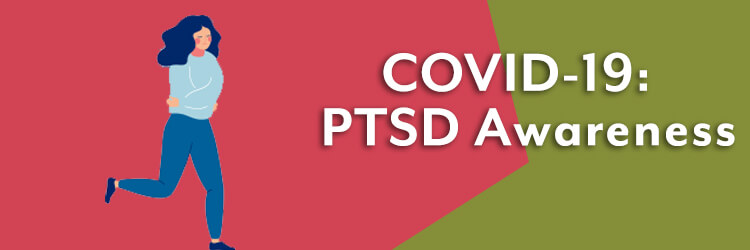[vc_row][vc_column][vc_column_text]June is PTSD Awareness Month. During “normal” times before the COVID-19 pandemic, it was estimated that 7 or 8 out of every 100 people would experience PTSD in their lifetimes. 2020 has not been normal. With the collective and ongoing trauma of a global pandemic, PTSD Awareness Month is especially apt.
The isolation and stress of COVID-19 have been a struggle for many with addiction. For people who have PTSD along with addiction, this may be an especially difficult time.
The link between addiction and Post-Traumatic Stress Disorder is strong. People with Substance Use Disorders and co-occurring PTSD report stronger cravings for substances than those without PTSD. Almost half of people who enter treatment for Substance Use Disorders have PTSD.
On top of that, the trauma of the pandemic may trigger memories of a past trauma. This could create a cycle of increased substance use.
But some people with PTSD have said they feel surprisingly calm in response to the pandemic. Those who have been in trauma-informed treatment may have built coping skills others may not have.
Lou Godbold, Executive Director of EchoTraining.Org—which provides trauma-informed trainings and resilience classes—said, “We’ve found the routines that are helpful, the tricks to calm down our nervous system, the tripwires for our thoughts, and the things we should avoid.”
Post-Traumatic Stress Disorder is treatable, which is why PTSD Awareness Month is so important. Awareness Months are designed to bring attention to a condition in order to increase public knowledge and resources. If people with PTSD aren’t aware treatment is possible—or even that they have the condition—they won’t get the help they need. And with COVID-19, there may be more of a demand for PTSD treatment. Post-traumatic stress tends to increase in times of crisis.
That said, not everyone who experiences a trauma will develop PTSD. Bejiing was heavily affected by SARS in the early 2000’s, and many healthcare practitioners experienced significant trauma. Still, only 10% of hospital employees working in Bejiing during SARS later had PTSD.
And though quarantine in itself has been shown to be traumatic—let alone because of illness—29% of people who responded to a survey about being quarantined due to SARS developed PTSD. That means almost three-quarters of people who had that experience didn’t develop PTSD.
This is important to note, because as therapist Jennifer Taitz writes in the New York Times: “Expecting the worst actually predicts heightened risk of PTSD, and my clients often notice that they cope with challenges better than they imagine they will.”
This doesn’t mean you can will away PTSD. It is an often-involuntary response to a significant trauma. But it does mean that if you’re worried you’re bound to come out of this experience with post-traumatic stress, it will be really helpful to try to focus that mental energy on other things. One way Taitz suggests doing so is remembering other times you’ve endured a very stressful situation. This shifts the focus and can improve mental health.
This PTSD Awareness Month is a good time for those who have been living with PTSD to honor their progress. And if you think you may have PTSD, it’s as good a time as any to consult a mental health professional and start the process of healing.
If you think you may have PTSD, a Substance Use Disorder, or another co-occurring mental health disorder, there is hope. TruHealing Centers is open throughout the COVID-19 crisis, with hospital-grade sanitization and telehealth options, so that you can feel safe in treatment. At our recovery centers across the country, we use trauma-informed therapy to help you build healthy coping skills. You can thrive in long-term recovery; we will help you get there. Call an admissions specialist at 410-593-0005.[/vc_column_text][/vc_column][/vc_row]









